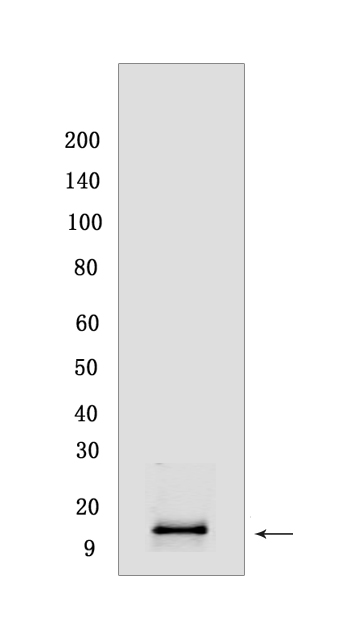S100A4 Rabbit mAb [R4PL]Cat NO.: A33663
Western blot(SDS PAGE) analysis of extracts from A375 cells.Using S100A4Rabbit mAb [R4PL] at dilution of 1:1000 incubated at 4℃ over night.
Product information
Protein names :S100A4,CAPL,MTS1,S10A4_HUMAN,Protein S100-A4
UniProtID :P26447
MASS(da) :11,729
MW(kDa) :12 kDa
Form :Liquid
Purification :Protein A purification
Host :Rabbit
Isotype :IgG
sensitivity :Endogenous
Reactivity :Human
- ApplicationDilution
- 免疫印迹(WB)1:1000-2000
- 免疫组化(IHC)1:100
- 免疫荧光(ICC/IF) 1:100
- The optimal dilutions should be determined by the end user
Specificity :Antibody is produced by immunizing animals with a synthetic peptide at the sequence of human S100A4
Storage :Antibody store in 10 mM PBS, 0.5mg/ml BSA, 50% glycerol. Shipped at 4°C. Store at-20°C or -80°C. Products are valid for one natural year of receipt.Avoid repeated freeze / thaw cycles.
WB Positive detected :A375 cells
Function : Calcium-binding protein that plays a role in various cellular processes including motility, angiogenesis, cell differentiation, apoptosis, and autophagy (PubMed:16707441, PubMed:23752197, PubMed:30713770). Increases cell motility and invasiveness by interacting with non-muscle myosin heavy chain (NMMHC) IIA/MYH9 (PubMed:16707441). Mechanistically, promotes filament depolymerization and increases the amount of soluble myosin-IIA, resulting in the formation of stable protrusions facilitating chemotaxis (By similarity). Modulates also the pro-apoptotic function of TP53 by binding to its C-terminal transactivation domain within the nucleus and reducing its protein levels (PubMed:23752197). Within the extracellular space, stimulates cytokine production including granulocyte colony-stimulating factor and CCL24 from T-lymphocytes (By similarity). In addition, stimulates T-lymphocyte chemotaxis by acting as a chemoattractant complex with PGLYRP1 that promotes lymphocyte migration via CCR5 and CXCR3 receptors (PubMed:30713770, PubMed:26654597)..
Tissue specificity :Ubiquitously expressed.
Subcellular locationi :Secreted. Nucleus. Cytoplasm.
IMPORTANT: For western blots, incubate membrane with diluted primary antibody in 1% w/v BSA, 1X TBST at 4°C overnight.


